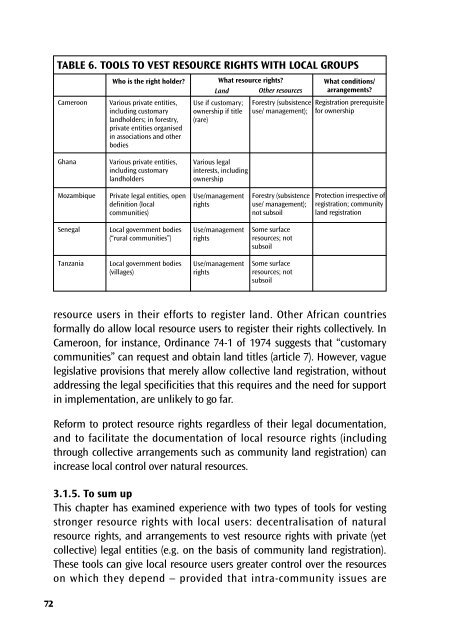Legal empowerment for local resource control
Legal empowerment for local resource control
Legal empowerment for local resource control
Create successful ePaper yourself
Turn your PDF publications into a flip-book with our unique Google optimized e-Paper software.
72<br />
TABLE 6. TOOLS TO VEST RESOURCE RIGHTS WITH LOCAL GROUPS<br />
Cameroon<br />
Ghana<br />
Mozambique<br />
Senegal<br />
Tanzania<br />
Who is the right holder?<br />
Various private entities,<br />
including customary<br />
landholders; in <strong>for</strong>estry,<br />
private entities organised<br />
in associations and other<br />
bodies<br />
Various private entities,<br />
including customary<br />
landholders<br />
Private legal entities, open<br />
definition (<strong>local</strong><br />
communities)<br />
Local government bodies<br />
(“rural communities”)<br />
Local government bodies<br />
(villages)<br />
What <strong>resource</strong> rights? What conditions/<br />
Land Other <strong>resource</strong>s<br />
arrangements?<br />
Use if customary; Forestry (subsistence Registration prerequisite<br />
ownership if title<br />
(rare)<br />
use/ management); <strong>for</strong> ownership<br />
Various legal<br />
interests, including<br />
ownership<br />
Use/management<br />
rights<br />
Use/management<br />
rights<br />
Use/management<br />
rights<br />
Forestry (subsistence<br />
use/ management);<br />
not subsoil<br />
Some surface<br />
<strong>resource</strong>s; not<br />
subsoil<br />
Some surface<br />
<strong>resource</strong>s; not<br />
subsoil<br />
Protection irrespective of<br />
registration; community<br />
land registration<br />
<strong>resource</strong> users in their ef<strong>for</strong>ts to register land. Other African countries<br />
<strong>for</strong>mally do allow <strong>local</strong> <strong>resource</strong> users to register their rights collectively. In<br />
Cameroon, <strong>for</strong> instance, Ordinance 74-1 of 1974 suggests that “customary<br />
communities” can request and obtain land titles (article 7). However, vague<br />
legislative provisions that merely allow collective land registration, without<br />
addressing the legal specificities that this requires and the need <strong>for</strong> support<br />
in implementation, are unlikely to go far.<br />
Re<strong>for</strong>m to protect <strong>resource</strong> rights regardless of their legal documentation,<br />
and to facilitate the documentation of <strong>local</strong> <strong>resource</strong> rights (including<br />
through collective arrangements such as community land registration) can<br />
increase <strong>local</strong> <strong>control</strong> over natural <strong>resource</strong>s.<br />
3.1.5. To sum up<br />
This chapter has examined experience with two types of tools <strong>for</strong> vesting<br />
stronger <strong>resource</strong> rights with <strong>local</strong> users: decentralisation of natural<br />
<strong>resource</strong> rights, and arrangements to vest <strong>resource</strong> rights with private (yet<br />
collective) legal entities (e.g. on the basis of community land registration).<br />
These tools can give <strong>local</strong> <strong>resource</strong> users greater <strong>control</strong> over the <strong>resource</strong>s<br />
on which they depend – provided that intra-community issues are

















